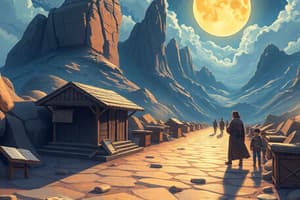Podcast
Questions and Answers
What does the term 'literature' derive from?
What does the term 'literature' derive from?
The Latin word 'littera' meaning letters.
Define prose.
Define prose.
A written or spoken language in its ordinary form, without metrical structure.
What is a biography?
What is a biography?
A story of a certain person's life written by another who knows him well.
What is an autobiography?
What is an autobiography?
What is a novel?
What is a novel?
What is a drama?
What is a drama?
What are the classifications of drama?
What are the classifications of drama?
Define comedy.
Define comedy.
What is poetry?
What is poetry?
Which type of poetry tells stories through verse?
Which type of poetry tells stories through verse?
The _____ is the time and place of the story.
The _____ is the time and place of the story.
What is an internal conflict?
What is an internal conflict?
What is climax in a story?
What is climax in a story?
Define falling action.
Define falling action.
What is the term for a struggle between a character and an outside force?
What is the term for a struggle between a character and an outside force?
What does 'denouement' mean?
What does 'denouement' mean?
Flashcards are hidden until you start studying
Study Notes
Definition of Literature
- Derived from Latin word littera, meaning letters.
- Represents a body of written works in a particular language, country, or age.
- A significant human experience expressed in carefully chosen and arranged words.
Forms of Literature
- Prose: Ordinary written or spoken language without metrical structure.
- Biography: Life story written by someone who knows the person well.
- Autobiography: Account of one's life written by oneself.
- Essay: Short literary composition that is expository in nature.
- Novel: Long fictitious narrative made up of chapters with a complex plot.
- Short Story: Compressed fictitious narrative focusing on a single time, place, and action.
- Drama/Play: Consists of dialogues in prose, intended for stage performance.
Types of Drama
- Tragedy: Explores downfall, emotional betrayal, moral setbacks, and loss; emphasizes action over narrative.
- Comedy: Aims to induce humor or amusement; includes laughter.
- Melodrama: Distinguishes clearly between good and evil characters.
Definition of Poetry
- Formulates a concentrated imaginative awareness of experience through language selected for effect.
- Derived from Greek word poesis, meaning "making or creating."
- Intensifies language compared to ordinary usage.
Types of Poetry
- Narrative Poetry: Tells stories through verse, featuring plot, characters, and setting.
- Lyric Poetry: Short poem with song-like qualities, expressing personal emotions and feelings.
- Dramatic Poetry: A narrative in verse meant to portray a story or situation.
Elements of a Story
-
Characters: Individuals, animals, or entities involved in the story.
- Major Characters: Well-developed with significant conflicts and backstories.
- Minor Characters: Less developed, serving supporting roles.
- Round Characters: Complex, mysterious, and unpredictable.
- Flat Characters: Stereotypical, lacking depth.
-
Types of Characters:
- Protagonist: Main hero or heroine.
- Antagonist: Opposes the protagonist.
- Deuteragonist: Second most important character.
-
Setting: Refers to the time and place of the story.
-
Conflict: A struggle or problem faced by characters.
- Internal Conflict: Occurs within a character's mind.
- External Conflict: Takes place between the character and outside forces.
Plot Structure
- Exposition: Introduces time, place, setting, and main characters.
- Inciting Incident: Triggers the chain of events.
- Rising Action: Develops problems faced by the main characters.
- Climax: The peak of the story with highest tension.
- Falling Action: Shifts in story following the climax, involving changes in the protagonist.
- Resolution: Settles the conflict and concludes the main plot.
- Denouement: French term meaning "to untie," providing closure to the narrative.
Narrative Order
- Chronological: Common order in narratives.
- Flashback: Author recounts events from a prior time.
Plot Devices
- Suspense: Feeling of excitement or tension as the plot unfolds.
- Surprise Ending: Unexpected twist that surprises the reader.
- Time Lapse: Skipping a period of time within the story.
Studying That Suits You
Use AI to generate personalized quizzes and flashcards to suit your learning preferences.




